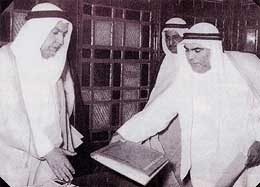"Kuwait is a fully independent Arab State with a democratic style of government, where sovereignty rests with the nation, which is the source of power." As prescribed by the constitution, the system of government is based on the separation of powers, although co-operation is required by the Constitution. The legislative authority is vested in the Amir and the national Assembly, while executive power is vested exclusively in the Amir and his Cabinet and Ministers.
The Constitution of the State of Kuwait is composed of 183 articles divided into five chapters:
The State and the System of Government.
The basic components of Kuwait Society.
General rights and duties.
Authorities.
General and provisional statutes.



